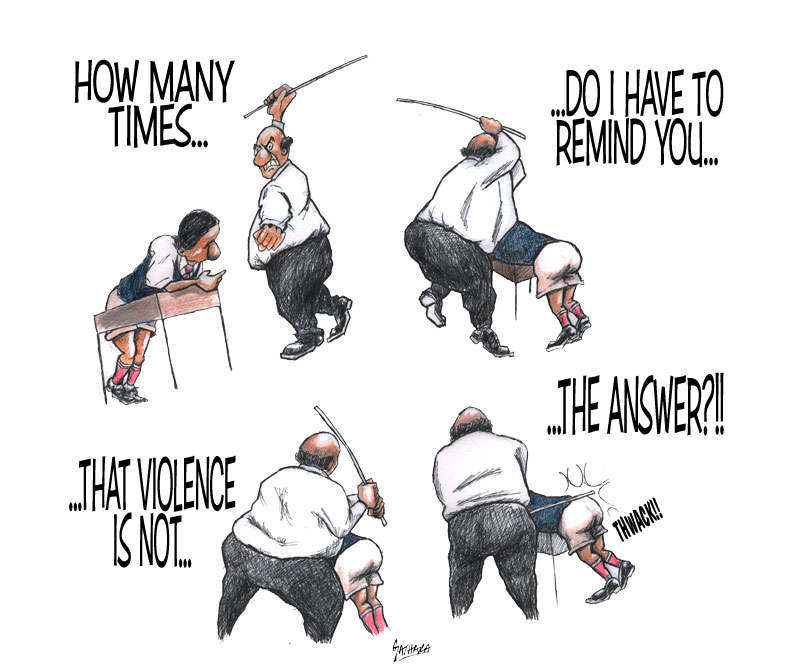So, let’s see if we’ve got this right.
On the side supporting the spanking and paddling of students are Shelby County School Board members Joe Clayton and David Reaves.
On the other side are the American Medical Association, the American Academy of Pediatrics, the Society for Adolescent Medicine, the American Psychological Association, the National Association of Secondary School Principals, and 31 states that have already forbidden it.
It seems like a clear winner for those who liken corporal punishment to state-sanctioned abuse of students. It’s also amazing that it’s an idea that just won’t die, as proven by the recent comments defending it by Mr. Clayton and Mr. Reaves.
Combat
Perhaps, revealing a little more about his psychological approach to education than he intended, Mr. Clayton – a former sports coach (it’s a Southern tradition for coaches to do a lot of paddling), a former county school principal, and a former Christian School principal – said forbidding paddling is “like sending a soldier into a combat zone and telling him he can’t take his weapon.”
As a general rule, we’d question the wisdom of allowing anyone who sees education as a war to have the power to invoke corporal punishment in the first place. But not to be outdone, Mr. Reaves dismissed mountains of research that show that paddling students has no lasting benefits and pointed to his own children as examples of how wonderful spanking works.
We don’t know his children, but using his analogy, if anyone is to spank children, perhaps it should be left to parents – although it seems that parents have already lost control and the moral high ground if the only way to get their points across is to strike their children. But, to adopt Mr. Reaves’ parent-centric approach, if Shelby County schools are to allow corporal punishment, they should also allow parents to exempt their children from it and to manage their children’s discipline in the home
Grab Your Ankles
It seems to us that when an educator decides to inflict corporal punishment, it is not the result of a student’s failure. It is the result of the educator’s failure, and often it results from angry teachers and principals unable to control their emotions and as a result, they resort to paddling their students.
We know from his previous positions on hot button issues that Mr. Clayton tends to rely on educational policies from the days of Ozzie and Harriet when “grab your ankles and bend over” was a theme heard in most schools. But, in the ensuing decades, there is now conclusive research that shows that an absence of any benefits from spanking students, not to mention that we can’t think of another segment of society where someone is allowed to be physically struck by another person in a power position, much less a person in a power position with a wooden object.
Research indicates that in districts where corporal punishment is still practiced, it is used disproportionately against boys and minority and disabled students. The fact that the old county school district still allows it but it is no longer used indicates to us that even there, educators have found more effective way to address students’ disciplinary issues.
Inequities
Research indicates that corporal punishment contributes to student’s aggressive, anti-social behavior and contributes to adults experiencing more depression and substance abuse.
It’s the solid red states of the South where corporal punishment remains prevalent. About 75% of all spankings in the U.S. take place in Texas, Arkansas, Mississippi, Tennessee, and Alabama. Interestingly, these are also states that end up on the wrong end of the rankings on school success.
The issue of corporal punishment will be revisited at the next school board meeting, and hopefully, someone will ask Mr. Clayton why when the county schools were using corporal punishment more widely that African-American students made up 71% of the students paddled although they only made up 38% of the enrollment.
Wise Heads
Richard Thompson at Mediaverse said it well a year ago: “Personally, I’m against corporal punishment in schools. It shouldn’t be one of many arrows in a school’s proverbial disciplinary quiver. Why? Because if I, as a parent, can’t discipline my child without fear of jail or Child Protective Services, there is no way that I would allow a school district to do it.”
Secretary of Education Arne Duncan said: “Education is the civil rights issue of our generation. The undeniable truth is that every day education experience for too many students of color violates the principle of equity at the heart of the American promise.”
Hopefully, wiser heads will prevail and the next school board meeting and corporal punishment will be put aside once and for all as the “weapon” that it is.





You forgot to include board member K. Whalum on the list of supporters.
We didn’t notice him saying anything in the recent meeting so we didn’t mention it. But he’s a staunch supporter for sure.
spare de rod.
spoile de childe.
until he come back with a Glock upside yo head.
Re: Whalum. He tweeted his support right after or during the meeting.
As I just discussed with you, I can’t believe this archaic topic is even being discussed and that corporal punishment is still legal in so many states….of course, they’re southern states. Go figure. Are we ever on the right side of anything?!